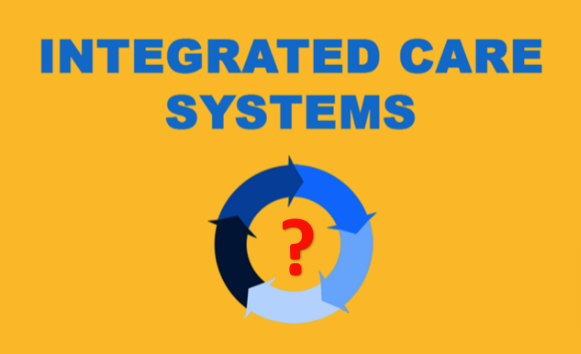By Harry LeitchIn a series of guest blog posts by Harry Leitch, Integrated Care Systems will be explained, and key concerns highlighted. The question will then be asked, what do these changes mean for communities? "Although seen by the media as suggesting the role of the private sector will be reduced, the proposed legislation, if passed, will enact the current government’s wish to further fragment, destabilise and privatise our NHS." - Keep Our NHS Public
During a pandemic that has revealed the necessity of universal, comprehensive and equitable healthcare, a top-down reorganisation of the NHS is underway. In accordance with proposals from the 2019 Long Term Plan, NHS England (NHSE) is transforming the NHS into Integrated Care Systems (ICS). For Keep Our NHS Public (KONP) and other campaign groups, these moves represent a severe threat to the NHS and a failure to achieve the increased and sustained funding required. Key concerns include use of a population health perspective, lack of regulation and increase presence of private companies within the NHS.
0 Comments
Confused about what exactly Community Wealth Building is? Like the sound of the latest Green New Deal but unsure what it means? Let Miles Thompson be your guide as he reflects on a rousing first Stir to Action festival Miles Thompson
In July, I rather surprised my tent which had only just been taken down from Glastonbury, by putting it up again just outside of Frome. The occasion was the inaugural Stir to Action festival. Its title: “Playground for the New Economy”. Stir to Action, founded by Jonny Gordon-Farleigh, produces both STIR, a quarterly magazine, and a nationwide series of workshops informing the public about aspects of the “New Economy”. But what is the New Economy? Hopefully this blog, summarising some of the content presented at the festival, will give you an overview if the term is new to you. It is also hoped the blog will map out a terrain where we can build more links between those interested in New Economies and those interested in Psychologists for Social Change (PSC). Both seem passionate about reforming the structures that create and maintain inequality, advancing alternatives to austerity and tackling the social determinants of distress. In austere times, outsourcing health services to private providers is becoming more common. To ensure service-users aren’t short changed and public spending isn’t wasted, commissioners need to take a much more hands-on approach Changing eating habits is often an element of a behaviour change programme
Recently, I spent a period working as a clinical psychologist in a health and well-being service, commissioned by a local authority in response to the UK’s obesity rate. The service is run by a small private organisation and was set up to promote healthy lifestyle behaviours. One of its aims is to support people to achieve a healthy weight to reduce the risk of preventable weight-related diseases and the human and economic costs associated with these. It does this with programmes designed to change people’s behaviours around food and eating and increase their physical activity. Aspects of the service were very encouraging. The team deployed creative ways of engaging local communities, statutory services and charities, ensuring a steady stream of suitable people referred to the service. It had established a strong presence in the community by taking part in health and wellbeing campaigns. The programmes were delivered by an enthusiastic though overstretched team that strongly abided by the “code” of the healthy lifestyle behaviours they promoted. A particularly exciting aspect of the service was that commissioners had recognised the role psychological and psychosocial factors play in the development and maintenance of obesity and behaviour change – hence the opening for a psychologist. I was excited to get stuck into my role, supporting this already vibrant service by integrating psychological theory and practice into the service delivery. Alas, my enthusiasm was short-lived. As I gained insights into how the service functioned, a nagging sense of unease took hold. A feeling, I now think, that stemmed from a tension created by the outsourcing of public services to private providers. It is hard to believe that the consequences of this tension are limited to this particular service - after all, in current economic times, this model of service procurement is becoming the norm. In fact, while writing this article, I had numerous conversations with colleagues working within the public and education sectors who found my experiences resonated with their own. This further convinced me to share my experiences as I hope they will stir up a further discussion. |
AuthorPSC is a network of people interested in applying psychology to generate social and political action. You don't have to be a member of PSC to contribute to the blog Archives
February 2022
Categories
All
|
PSYCHOLOGISTS FOR SOCIAL CHANGE
- Home
- About
-
Groups
- Blog
-
Position statements
- UK >
-
Cymru / Wales
>
- Consultation Responses
- Housing Support Funding
- Connecting the Dots Report
- Chemical Imbalance Myth
- Review of use of dx PD
- UK Inhumane Removal Plans
- WG LGBT+actionplan
- Ty Coryton
- Commission on Race and Ethnic Disparities: The Report
- ECT Review
- Black Lives Matter
- COVID 19 and Internet Access
- Save the T4CYP Programme
- Support the Mind over matter Report
- UN Report on Extreme Poverty in the UK Letter
- England >
- Ireland >
- Northern Ireland
- Scotland
-
Campaigns
- Join our mailing list



 RSS Feed
RSS Feed
